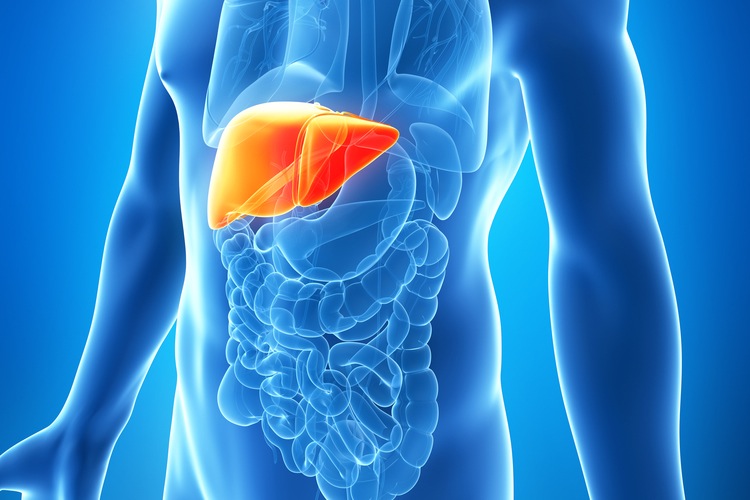Liver Cancer: Symptoms and Treatment

Liver cancer is cancer that begins in the tissues of the liver. It's the fourth most common cause of cancer death in the world, accounting for 782,000 deaths each year, according to the World Health Organization.
This type of cancer includes hepatocellular carcinoma (HCC) and the less common, bile duct cancer (cholangiocarcinoma), according to the National Cancer Institute (NCI). (The bile ducts are thin tubes that connect the liver, small intestine and gallbladder).
The NCI estimates there was 42,220 new cases of liver cancer in 2018 and 30, 200 deaths. Between 2008 and 2014, approximately 17.7 percent of people diagnosed with liver cancer survived past five years.
Around 1 percent of people will be diagnosed with this cancer at some point in their lifetime, according to the NCI. The rates of liver cancer diagnoses have been increasing by 2.6 percent every year for the past 10 years.
Risk factors for liver cancer include hepatitis B and C (hepatitis is the inflammation of the liver), cirrhosis (a condition in which liver tissue scars and prevents the flow of blood through the liber, that can be caused by excess drinking or hepatitis) and aflatoxin (poison from a type of fungus that can grow on improperly stored food), according to the NCI.
Symptoms
Most people in the early stages of primary liver cancer do not experience any signs or symptoms, said Dr. David Bernstein, chief of hepatology at the North Shore Long Island Jewish Health System.
"The most common symptom of liver cancer is that it's asymptomatic," Bernstein said.
Get the world’s most fascinating discoveries delivered straight to your inbox.
Symptoms, if they do appear, can include a hard lump or pain on the right side of the abdomen, abdominal swelling, loss of appetite, unexplained weight loss, nausea and jaundice.
Diagnosis & tests
Physicians conducting routine physical examinations may be able to detect an enlarged, tender liver, and they can further confirm their findings through abdominal ultrasound and CT scans, according to the National Institutes of Health (NIH).
"It's different form most other cancers in that we can generally make the diagnosis without doing a liver biopsy," Bernstein told Live Science.
However, enlarged liver and abnormal liver function can be indicative of other liver diseases. The doctor will need to narrow down the diagnosis by performing further tests such as a liver biopsy, where a sample of the liver tissue is removed and examined for abnormal growth.
Doctors can also test for tumor markers, such as alpha-fetoprotein (AFP), Bernstein said. AFP is a protein that's usually produced by the fetus but can signal the presence of hepatocellular carcinoma (HCC) if it's found in adults. AFP can also signal whether a person is pregnant or has other types of cancer.
If the patient is diagnosed with liver cancer, further tests might need to be done to see if the cancer has spread to other parts of the body.
Treatment & medication
In addition to various treatments currently being studied in clinical trials, the common treatments available to combat liver cancer are surgery, radiation therapy and chemotherapy. The type of treatment will depend on the type and the stage of cancer being treated, according to the National Cancer Institute. The following list lists some of the possible treatment methods:
Ablation therapy is a treatment that destroys or removes the cancerous tissues. Radiofrequency ablation is a minimally invasive option, in which a doctor uses a needle electrode to deliver high-energy radio waves to heat and kill the cancer cells.
For patients with early-stage liver cancer, surgery may involve a partial hepatectomy, where the diseased portion of the liver is removed, or liver transplant surgery, where the entire liver is removed and replaced. To get a liver transplant, the person will need a donor who has the same blood type and a liver that is approximately the same size, Bernstein said.
External radiation therapy, which is the more common form of radiation therapy, uses X-rays or other high-energy rays to kill cancer cells and shrink tumors, according to the National Cancer Institute. There's also internal radiation therapy, where the radioactive substance is sealed in needles, wires, or catheters and then placed at a spot close to the tumor.
Chemotherapy uses drugs to kill or temporarily slow the growth of cancer cells. The drug can be released through an implanted pump or injected into a vein or the hepatic artery to deliver a high concentration of the drugs directly to cancer cells in the liver, according to the National Cancer Institute.
For patients who cannot have ablation therapy or surgery to remove the cancerous tissues, and whose tumors haven't spread outside of the liver, embolization therapy can be an option, according to the NCI. In this treatment, substances block or decrease blood flow through a key artery to starve the tumor of oxygen and nutrients that it needs to grow.
Prevention
If the liver is damaged for a long time as a result of hepatitis, it can increase the risk of liver cancer. Vaccinations against hepatitis B have shown to be an effective way to prevent HCC, according to the NCI. (There is no vaccine to prevent against Hepatitis C).
Ways to avoid hepatitis C include avoiding IV drugs, practicing safe sex and only getting tattoos and piercings from clean, reputable shops, according to the Mayo Clinic.
For some high-risk patients with chronic hepatitis B and C infections or cirrhosis screening could be an option.
Additional resources
- The National Cancer Institute has more information on statistics, prevention, treatment, coping and new research on liver cancer.
- Use this guide at the American Cancer Society to help you find the best treatment for liver cancer in your area.
- Learn more about liver transplants in this guide offered by the Mayo Clinic.
This article is for informational purposes only and is not meant to offer medical advice. This article was updated on Feb. 13, 2015 by Live Science Senior Writer, Laura Geggel, and again on Oct. 11, 2018 by Live Science Staff Writer, Yasemin Saplakoglu.
 Live Science Plus
Live Science Plus





